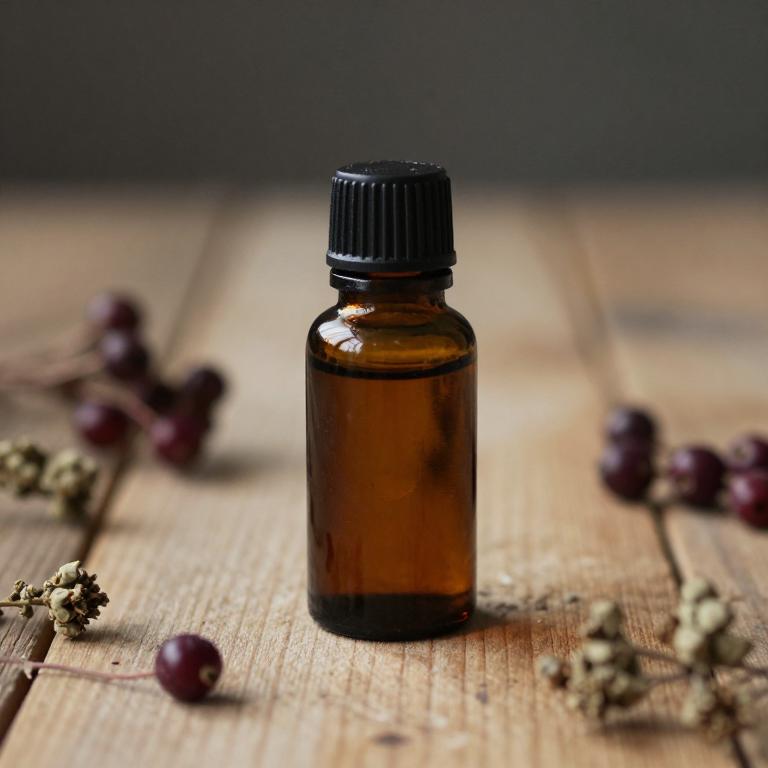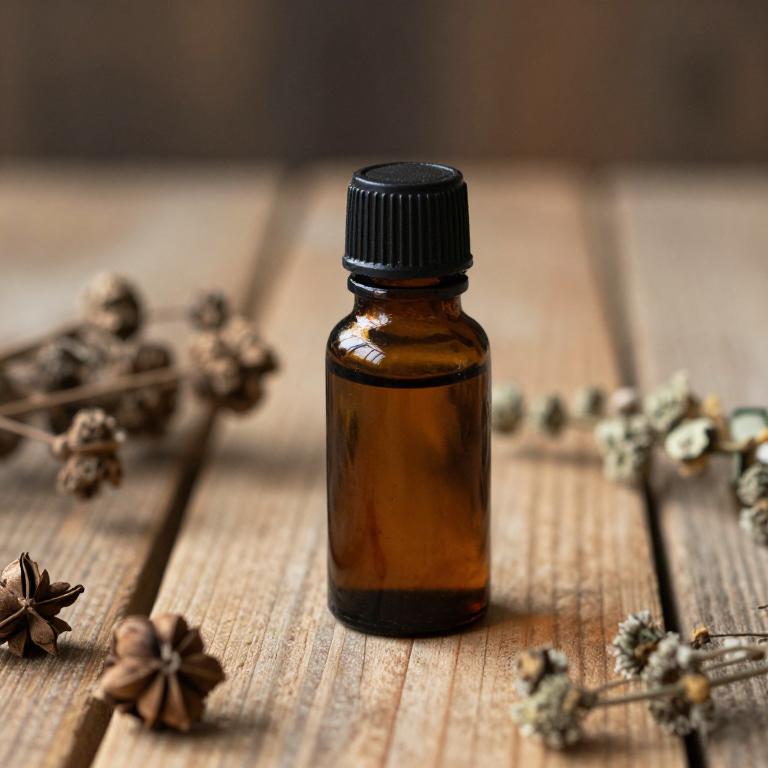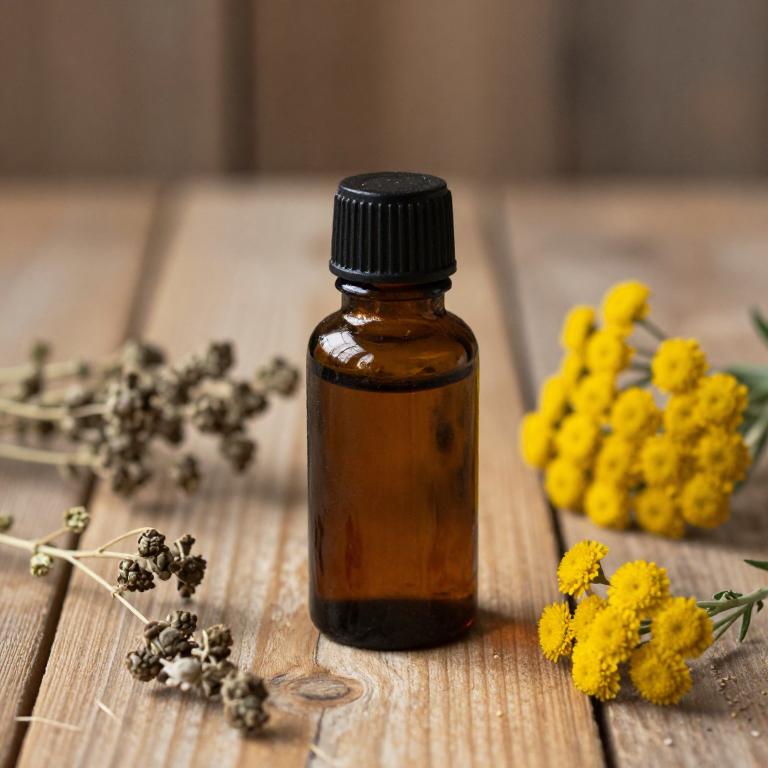10 Best Herbal Essential Oils For Inflammation

Herbal essential oils have gained popularity for their potential anti-inflammatory properties, offering a natural alternative to conventional treatments.
Oils such as lavender, ginger, and turmeric are commonly used due to their ability to reduce swelling and pain associated with inflammation. These oils work by interacting with the body's inflammatory pathways, often through their antioxidant and anti-oxidative compounds. They can be applied topically, inhaled, or used in diffusers to provide relief.
While they may offer benefits, it is important to consult a healthcare professional before using them, especially for chronic or severe inflammatory conditions.
Table of Contents
- 1. Turmeric (Curcuma longa)
- 2. Ginger (Zingiber officinale)
- 3. Salvia (Salvia officinalis)
- 4. Ceylon cinnamon (Cinnamomum zeylanicum)
- 5. Thyme (Thymus vulgaris)
- 6. Dog rose (Rosa canina)
- 7. Black pepper (Piper nigrum)
- 8. Chaste tree (Vitex agnus-castus)
- 9. Indian frankincense (Boswellia serrata)
- 10. Yarrow (Achillea millefolium)
1. Turmeric (Curcuma longa)

Curcuma longa, commonly known as turmeric, is widely recognized for its anti-inflammatory properties, largely attributed to the compound curcumin.
The essential oils derived from Curcuma longa contain volatile compounds such as turmerone, which have been shown to possess significant anti-inflammatory effects. These oils are often used in aromatherapy and topical applications to reduce inflammation in conditions like arthritis and muscle pain. Research suggests that the essential oils may work synergistically with curcumin to enhance their therapeutic benefits.
However, further clinical studies are needed to fully understand their efficacy and safety in long-term use.
2. Ginger (Zingiber officinale)

Zingiber officinale, commonly known as ginger, is a widely used herb whose essential oils have shown promising anti-inflammatory properties.
The essential oil of ginger contains bioactive compounds such as gingerol, shogaol, and zingerone, which are known to inhibit inflammatory pathways in the body. These compounds work by reducing the production of pro-inflammatory cytokines and enzymes like COX-2, thereby alleviating symptoms of inflammation. Studies suggest that ginger essential oil may be beneficial in managing conditions such as arthritis, muscle pain, and digestive inflammation.
As a natural alternative to synthetic anti-inflammatory agents, ginger essential oil is increasingly being explored for its therapeutic potential in holistic health practices.
3. Salvia (Salvia officinalis)

Salvia officinalis, commonly known as sage, is a versatile herb whose essential oils have been widely studied for their anti-inflammatory properties.
The essential oil of sage contains compounds such as thujone, camphor, and cineole, which contribute to its ability to reduce inflammation by modulating inflammatory pathways in the body. Research suggests that these oils may help alleviate symptoms associated with conditions like arthritis and skin inflammation due to their antioxidant and antimicrobial effects. When used topically or in aromatherapy, sage essential oil can provide localized relief and support the body's natural inflammatory response.
However, it is important to use sage essential oil with caution, as it can be potent and may cause adverse effects if not diluted properly.
4. Ceylon cinnamon (Cinnamomum zeylanicum)

Cinnamomum zeylanicum, commonly known as cinnamon bark, is a valuable source of essential oils renowned for their anti-inflammatory properties.
The essential oil derived from its bark contains potent compounds like cinnamaldehyde and eugenol, which have been shown to reduce inflammatory markers in the body. These oils work by inhibiting pro-inflammatory enzymes and cytokines, making them effective in managing conditions such as arthritis and skin inflammation. When used topically or aromatically, cinnamon essential oil can provide localized relief and support overall immune function.
Due to its natural therapeutic benefits, Cinnamomum zeylanicum essential oil is widely used in aromatherapy and complementary medicine for its anti-inflammatory effects.
5. Thyme (Thymus vulgaris)

Thymus vulgaris, commonly known as thyme, is a popular herb used in traditional medicine for its potent essential oils, which are renowned for their anti-inflammatory properties.
The essential oil of thyme contains compounds such as thymol and carvacrol, which have been shown to reduce inflammation by inhibiting pro-inflammatory pathways in the body. These oils are often used in aromatherapy and topical applications to alleviate symptoms of conditions like arthritis, muscle pain, and respiratory infections. Research suggests that thyme essential oil may also support immune function, making it a valuable natural remedy for inflammatory disorders.
Due to its strong potency, it is typically diluted before use to ensure safety and effectiveness.
6. Dog rose (Rosa canina)

Rosa canina, also known as rosehip, is a traditional herbal remedy that contains essential oils with potent anti-inflammatory properties.
These essential oils are derived from the fruit and seeds of the Rosa canina plant, which has been used for centuries in herbal medicine for its therapeutic benefits. The anti-inflammatory effects of Rosa canina essential oils are attributed to their high concentration of bioactive compounds such as tocopherols, flavonoids, and polyunsaturated fatty acids. When applied topically or used in aromatherapy, these oils can help reduce inflammation in conditions like arthritis and skin irritations.
Overall, Rosa canina essential oils offer a natural and effective option for managing inflammatory responses in the body.
7. Black pepper (Piper nigrum)

Piper nigrum, commonly known as black pepper, contains essential oils that have been studied for their potential anti-inflammatory properties.
The essential oils derived from black pepper include compounds such as piperine, which is known for its ability to modulate inflammatory responses in the body. These oils may help reduce inflammation by inhibiting the production of pro-inflammatory cytokines and enzymes like COX-2. Research suggests that piper nigrum essential oils could be beneficial in managing conditions such as arthritis and inflammatory skin disorders.
However, further clinical studies are needed to fully understand their efficacy and safety when used as a complementary therapy for inflammation.
8. Chaste tree (Vitex agnus-castus)

Vitex agnus-castus, also known as chasteberry, is a herbal plant that has been traditionally used for its potential anti-inflammatory properties.
While it is more commonly known for its use in hormonal balance, recent studies suggest that its essential oils may possess bioactive compounds capable of reducing inflammation. These essential oils are typically extracted through steam distillation and contain various phytochemicals, such as flavonoids and terpenoids, which are known for their anti-inflammatory effects. When applied topically or used in aromatherapy, vitex essential oils may help alleviate symptoms associated with inflammatory conditions.
However, further research is needed to fully understand their efficacy and safety in treating inflammation.
9. Indian frankincense (Boswellia serrata)

Boswellia serrata, also known as Indian frankincense, contains essential oils that have been traditionally used for their anti-inflammatory properties.
The active compounds in these oils, such as boswellic acids, inhibit the production of inflammatory mediators like leukotrienes and prostaglandins. Studies suggest that Boswellia serrata essential oils may help reduce inflammation in conditions such as arthritis and inflammatory bowel disease. These oils are often used in aromatherapy and topical applications to alleviate pain and swelling.
However, it is important to consult with a healthcare provider before using Boswellia serrata, especially for individuals with existing medical conditions or those taking medications.
10. Yarrow (Achillea millefolium)

Achillea millefolium, commonly known as yarrow, is a herb traditionally used for its anti-inflammatory properties.
Its essential oil, derived through steam distillation of the dried aerial parts of the plant, contains bioactive compounds such as chamazulene, bisabolol, and flavonoids, which contribute to its therapeutic effects. Studies suggest that the essential oil of Achillea millefolium may help reduce inflammation by inhibiting pro-inflammatory enzymes and cytokines. It is often used in aromatherapy and topical applications for conditions like arthritis, muscle pain, and skin inflammation.
However, it should be used with caution and under professional guidance, as it may interact with certain medications or cause allergic reactions in some individuals.